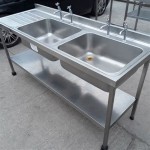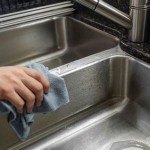Garbage Disposal Odor Under Sink
A foul odor emanating from the garbage disposal is a common household nuisance. While disposals are designed to grind food waste, small particles can linger, leading to bacterial growth and unpleasant smells. Understanding the causes and implementing preventive measures can effectively eliminate these odors and maintain a fresh-smelling kitchen.
1. Food Debris Buildup
One of the primary culprits of garbage disposal odor is accumulated food debris. Tiny particles of food can become trapped within the disposal's components, particularly around the grinding chamber and splash guard. Over time, these particles decompose, producing the characteristic foul odor. Regular cleaning is essential to prevent this buildup.
2. Biofilm Accumulation
Biofilm, a slimy layer of bacteria, can readily form on the moist surfaces within the garbage disposal. This biofilm not only contributes to unpleasant odors but can also harbor harmful microorganisms. The continuous presence of food particles and moisture provides an ideal environment for biofilm proliferation.
3. Clogged Drain Lines
While the odor may seem localized to the disposal itself, a clogged drain line can also contribute to the problem. Standing water in the drain pipes creates a breeding ground for bacteria, intensifying the smell and potentially causing backups. Ensuring proper drainage is crucial for odor prevention.
4. Grease and Fat Buildup
Pouring grease or fat down the drain is a common mistake that can significantly contribute to garbage disposal odors. Grease solidifies as it cools, clinging to the disposal's internal components and the drain pipes. This buildup restricts water flow, traps food particles, and fosters bacterial growth, exacerbating the odor issue.
5. Lack of Regular Cleaning
Infrequent cleaning is a major contributor to persistent garbage disposal odors. Failing to regularly clean the disposal allows food particles and biofilm to accumulate, leading to the unpleasant smells. Establishing a consistent cleaning routine is fundamental to maintaining a fresh-smelling disposal.
6. Hard Water Deposits
Hard water contains high levels of minerals, which can deposit on the internal surfaces of the garbage disposal. These deposits create a rough surface that traps food particles and promotes biofilm growth, contributing to odor problems. Areas with hard water may require more frequent cleaning or the use of specific cleaning agents to address mineral buildup.
7. Septic Tank Issues (if applicable)
For homes with septic systems, garbage disposal odors can sometimes indicate an underlying issue with the septic tank itself. If other plumbing fixtures exhibit similar odors, or if the odor persists despite regular cleaning, it's advisable to consult a septic system professional. A malfunctioning septic tank can release gases, contributing to unpleasant smells throughout the house.
Addressing Garbage Disposal Odors
Several methods can be employed to eliminate and prevent garbage disposal odors. Regular flushing with hot water and dish soap helps to remove loose food particles. Grinding ice cubes can help dislodge stubborn debris clinging to the grinding components. Cleaning with baking soda and vinegar is a natural and effective way to neutralize odors and remove biofilm. Commercial garbage disposal cleaners are also available, but it's important to choose products specifically designed for disposals to avoid damaging the unit.
Preventing Future Odors
Preventive measures are essential for maintaining a fresh-smelling garbage disposal. Avoiding putting grease, fat, fibrous foods, and starchy foods down the drain can significantly reduce the likelihood of clogs and odor buildup. Running cold water during and after disposal operation helps flush away food particles. Regularly cleaning the disposal, ideally once or twice a week, prevents the accumulation of debris and biofilm. Using natural odor eliminators, such as citrus peels or baking soda, can help maintain a fresh scent.
Maintaining a Functional Disposal
Proper maintenance ensures the longevity and effectiveness of the garbage disposal. Avoiding overloading the disposal prevents strain on the motor and reduces the chance of jams. Running cold water for a minute after each use flushes away residual food particles. Periodically checking the splash guard for trapped debris helps maintain optimal performance. Adhering to these simple maintenance practices can prevent odors and extend the lifespan of the garbage disposal.

Why Your Insinkerator Garbage Disposal Smells Bad Cody S Appliance

How To Get Rid Of Garbage Disposal Smells Plumb Works

How To Get Rid Of My Garbage Disposal Smells Mr Rooter

7 Ways To Clean A Smelly Garbage Disposal

Plumbing Sewer Smell After Installing Garbage Disposal Home Improvement Stack Exchange

How To Clean A Garbage Disposal That Smells Bad Affresh

Kitchen Odor Free Food Waste Garbage Disposal Processor Disposer And Made In China Com

Exactly How To Get Rid Of Smell In Garbage Disposal Naturally Sustain Life Journal

Deodorize A Kitchen Sink That Smells 5 Ways Youtube

Fix A Smelly Garbage Disposal In 3 Easy Steps Reichelt Plumbing







